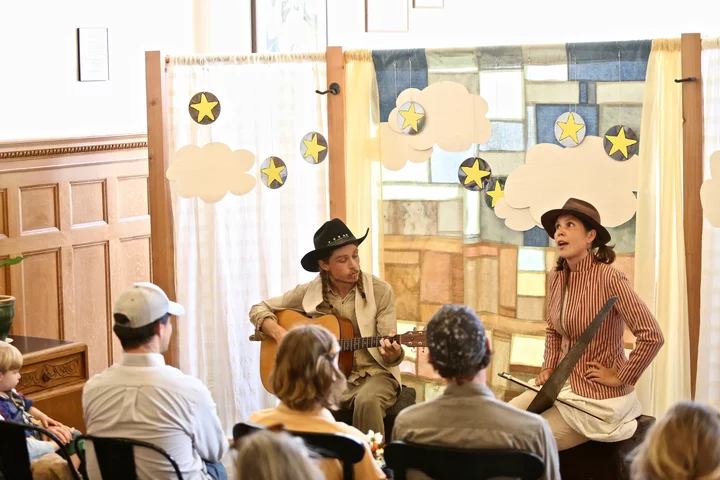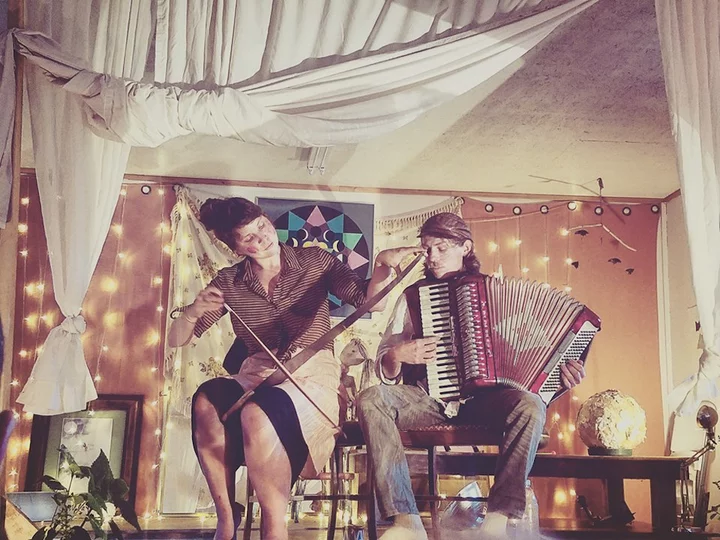The Cowtown Serenaders perform at the 2019 Fringe Festival in Eureka. Photo credit: Andrew Goff.
“Tales from Cowtown,” a puppet theater project led by Tayloranne Finch and Daniel Nickerson, will soon be traveling to rural sites across Northern California, thanks to a California Upstate Creative Corps grant. Finch and Nickerson, multi-hyphenate veterans of the Humboldt music scene and partners in art and life, play music together as the Cowtown Serenaders; they also have a rock and roll band / jukebox project called the Blueberry Hill Boogie Band. Their new, all-ages multimedia performance with fellow puppeteers Rory Cullifer and Sara Kei debuts in Humboldt, Mendocino and Trinity counties this spring.
“Tales from Cowtown” presented a welcome opportunity for Finch and Nickerson to expand the fictional world of Cowtown, which they introduced in previous Serenaders performances. Cowtown’s puppet residents come together as a community to model resilience when they are challenged by natural disasters. They get to do some thinking about human beings’ relationship with the natural world along the way. Rural regions in Northern California have been shaken in recent years; kids in the “Tales from Cowtown” audience will have already experienced disruptions and evacuations due to earthquakes, wildfires and floods. The artists want their show to acknowledge the reality of an increasingly unstable environment, while at the same time demonstrating that climate crisis accentuates the need for rural communities to come together. When I sat down with them, our conversation touched on puppet theater’s radical potential and the manifold challenges of taking puppets on the road.
“So much about natural disasters is about relationships,” Nickerson observed. “I was in Ferndale recently talking to a couple of locals, who were both like, ‘Yeah, as soon as the earthquake happened, it didn’t matter who you voted for. Everybody’s checking in on each other to make sure they have water to drink.’ Ultimately, we all need water and food and access to safe and clean places. We come together, even if there are some differences.”
“We’ve been thinking about theater and how to use it, what it brings to rural audiences, what it has to say to folks who live out in the country,” Finch explained. “The performance is set in Cowtown, and we know some things about Cowtown,” Nickerson agreed. “Puppet theater is connected to talking about the Earth, because puppet theater is elemental and performative. There’s a great quote from (the poet) Gary Snyder: ‘Performance is art in motion, enactment, embodiment, which is exactly what nature herself is.’”
When they’re not playing music or creating puppet theater, Finch and Nickerson are likely to be doing “earth work” in the garden or the field. The duo live and farm off the grid in southern Humboldt, observing permaculture principles. This spring they have been rehearsing “Tales from Cowtown” at Outer Space Arcata, taking advantage of grid-powered electricity to work on scene painting in the weeks before Daylight Savings Time began.
The Cowtown Serenaders perform in 2017 in Celo, North Carolina, at the HoneyLa Clubhouse. Photo credit: Leaf.
Part of serving a rural population is adapting to different standards of resource availability. With upcoming tour dates scheduled for outdoor spaces, Finch and Nickerson are working to create a theater that’s electricity-independent. They travel with a collapsible marionette stage that breaks down into a trunk, which Nickerson built. “That’s been one of our guiding design elements,” he explained; “how do you engage or bring entertainment without needing to be in an electrified space? We like the idea of a puppet theater that pops out of the back of a truck, in the middle of a place where there’s no theater and no lights or electricity.” “Tales from Cowtown” is inspired by projects that take art and bring it to life in unconventional spaces. The Bread and Puppet Theater, based in Vermont, is an influence. “They started with performances that protested the Vietnam War,” Finch said, “advocating for puppet theater because of its radicality and its affordability. We realized that this was applicable to our setting out here in rural Humboldt, where people have limited media access. Not everybody has the internet, or a personal laptop. A film wouldn’t reach a lot of these audiences, in the places we’re visiting.”
Cowtown is a place where animals, plants and even inanimate objects may voice perspectives on current events. “A lot of our characters are animals and plants,” Nickerson said. “It’s about listening to non-human voices; river-speak and earth-speak and plant-speak. Puppetry lends itself to that.” Finch continued the thought. “What’s fun and sort of radical about puppet theater is, it’s about relating to otherness. You take something that’s non animate, and then you animate it, and people can relate to it. And, like Sesame Street and Mr. Rogers taught us, a little sock puppet thing can create deep and profound feelings and relationships. Sock puppets can speak truths that would maybe feel a bit absurd for two humans to try and say to each other.”
Engaging with puppets “puts you in a certain head space,” Nickerson agreed. “Puppets have this way of bringing out the child. You have to imagine, to believe in a puppet. So then, you have to imagine that other worlds are possible.”
Puppet theater may even be able to encourage rural audience members to reach out across the political divide, the performers reckon. Nickerson pointed out that, while California is perceived as a liberal state, he and Finch hail from parts that are decidedly not. “People perceive Humboldt and Mendocino as liberal, hippie counties, which is not necessarily the case. If you are outside of city centers, there’s a lot of rural conservatism. We’re living on the divide between those two worlds. And we’re peacekeepers by nature, you know? Some people wanna fight the fights that wanna be fought, and we don’t; we want to find ways for the people who are fighting to come together and chill out. Being humans together is hard, and there’s many things that happen that cause you to lose trust,” he concluded. “But ultimately, when you’re talking about disasters, you need each other. Telling stories about the imaginary world of Cowtown gives us the opportunity to ask, ‘what does it look like to live together and work together?’”
Both performers laughed about puppetry’s tendency to burgeon into a life-consuming, situational endeavor. When developing a previous Cowtown Serenaders show in 2019, they worked from a pre-existing script. This time around, Finch pointed out, they had been developing the puppets and the script at the same pace. “The character comes first, and then the script evolves to include it. You query the puppets: what’s going on? We ask our river puppet — how do you feel, river? What is your motivation? We’re trying to let the story synthesize. Not micromanaging the details, but letting it evolve in a natural way. It’s a delightful, maddening process,” she continued. “I value that, and I believe in it. And then sometimes I’m like, ‘Oh, this is a form of self-induced insanity!’”
Finch and Nickerson believe in a “radically inclusive” approach. “Taylor’s credo is: ‘How do I say yes to everybody’s creative idea for this show?’” Nickerson commented. “That’s a hallmark of Taylor’s aesthetic as an artist: the yes. It’s a generous way to work. And, you get to be surprised by things. We have some control, but not a lot. I bet some theater professionals like to create in very controlled environments. But if you ever hang out with farmers, you know they do not have control. Maybe some elements of control, not much. I don’t know if we’re attracted to earth work because of that. Creating theater is much like creating on the farm. When you’re maintaining a production farm, you’re maintaining a very eclectic to-do schedule. You’re working toward yes, moving in the path of least resistance by developing everything simultaneously, doing a lot of different things and including a lot of different resources. The Earth has its say on certain projects. You have to be able to adapt and say, ‘Okay, Earth, you can have that one.’”
“Puppet theater is definitely the art farm, in some way,” Finch agreed, laughing. “Seasonal, a lot of things happening at once. The art farm aesthetic: that’s a good summary of Cowtown working style.”
###
To learn more about “Tales from Cowtown” or donate to help support this project, go to this link.
Follow
on Facebook and Instagram @thecowtownserenaders
Check
out Cowtown Boogie Records on Bandcamp.
###
“Tales from Cowtown” upcoming dates:
- Saturday, April 27 - Blue Lake Block Party
- Friday, May 10 - Covelo Farmers Market
- Saturday, May 11 - Willits - Recreation Grove Park
- Friday, May 17 - Willow Creek - Tish Tang Park
- Saturday, May 18 - Weaverville - Lee Fong Park
- Sunday, May 19 - Hyampom Community Hall
- Saturday, May 25 - Redway - KMUD Block Party
- Friday, June 21 - Middletown Farmers Market
- Saturday, June 22 - Lakeport Waterfront Park


CLICK TO MANAGE